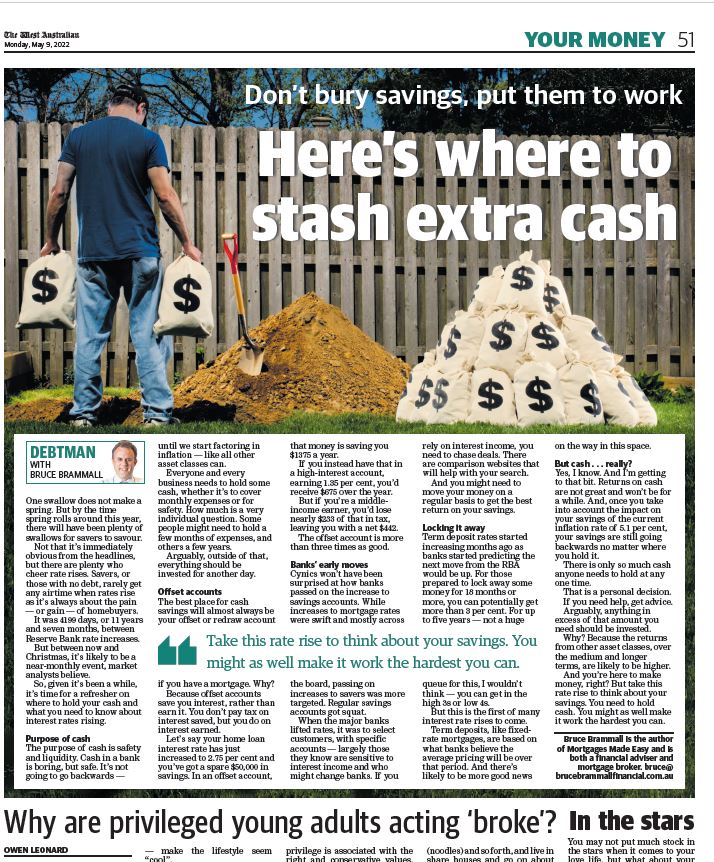Debt Man column – The West Australian (Money)
9 May, 2022.

Bruce Brammall, The West Australian, 9 May, 2022
One swallow does not make a Spring. But by the time Spring 2022 rolls around this year, there will have been plenty of swallows for savers to savour.
Not that it’s immediately obvious from the headlines, but there are plenty who cheer rate rises.
Savers, or those with no debt, rarely get any air time when rates rise as it’s always about the pain (or gain) of homebuyers.
It was 4199 days, or 11 years and 7 months, between Reserve Bank rate increases. But between now and Christmas 2022, it’s likely to be a near monthly event, market analysts believe.
So, given it’s been a while, time for a refresher on where to hold your cash and what you need to know about interest rates rising?
Purpose of cash
The purpose of cash is safety and liquidity. Cash in a bank is boring, but safe. It’s not going to go backwards (until we start factoring in inflation), like all other asset classes can.
Everyone and every business needs to hold some cash, whether it’s to cover monthly expenses, or for safety. How much is a very individual question. Some people might need to hold a few months of expenses. Others a few years.
Arguably, outside of that, everything should be invested. For another day.
Offset accounts
The best place for cash savings will almost always be your offset or redraw account, if you have a mortgage.
Why? Because offset accounts save you interest, rather than earn it. You don’t pay tax on interest saved, but you do on interest earned.
Let’s say your home loan interest rate has just increased to 2.75 per cent and you’ve got a spare $50,000 in savings. In an offset account, that money is saving you $1375 a year.
If you instead have that in a high-interest account, earning 1.35 per cent, you’d receive $675 over the year. But if you’re a middle-income earner, you’d lose nearly $233 of that in tax, leaving you with a net $443.
The offset account is more than three times as good.
Banks early moves
Cynics won’t have been surprised with how banks passed on the increase to savings accounts.
While increases to mortgage rates was swift and predominantly across the board, passing on interest rate increases to savers was more targetted.
Regular savings accounts got squat. When the major banks lifted rates, it was to select customers, with specific accounts. Largely those they know are sensitive to interest income and who might change banks.
If you rely on interest income, then you need to chase deals. There are comparison websites that will help with your search. And you might need to move your money on a regular basis in order to get the best return on your savings.
Locking it away
Term deposit rates started increasing months ago, as banks started predicting the next move from the RBA would be up.
For those prepared to lock away some money for 18 months or more, you can potentially get over three per cent.
For up to five years – not a huge queue for this, I wouldn’t think – you can get in the high threes or low fours.
But this is the first, of many, interest rate rises to come. Term deposits, like fixed rate mortgages, are based on what banks believe the average pricing will be over that period. And there’s likely to be more good news on the way in this space.
But cash … really?
Yes, I know. And I’m getting to that bit.
Returns on cash are not great and won’t be for a while. And, once you take into account the impact on your savings of the current inflation rate of 5.1 per cent … your savings are still going backwards no matter where you hold it.
As earlier, there is only so much cash that anyone needs to hold at any one time. That is a personal decision. If you need help, get advice.
Arguably, what is in excess of that amount you need should be invested. Why? Because the returns from other asset classes, over the medium and longer terms, are likely to be higher. And you’re here to make money, right?
But take this rate rise to think about your savings. You need to hold cash. You might as well make it work the hardest you can.
Bruce Brammall is the author of Mortgages Made Easy and is both a financial adviser and mortgage broker. E: bruce@brucebrammallfinancial.com.au.